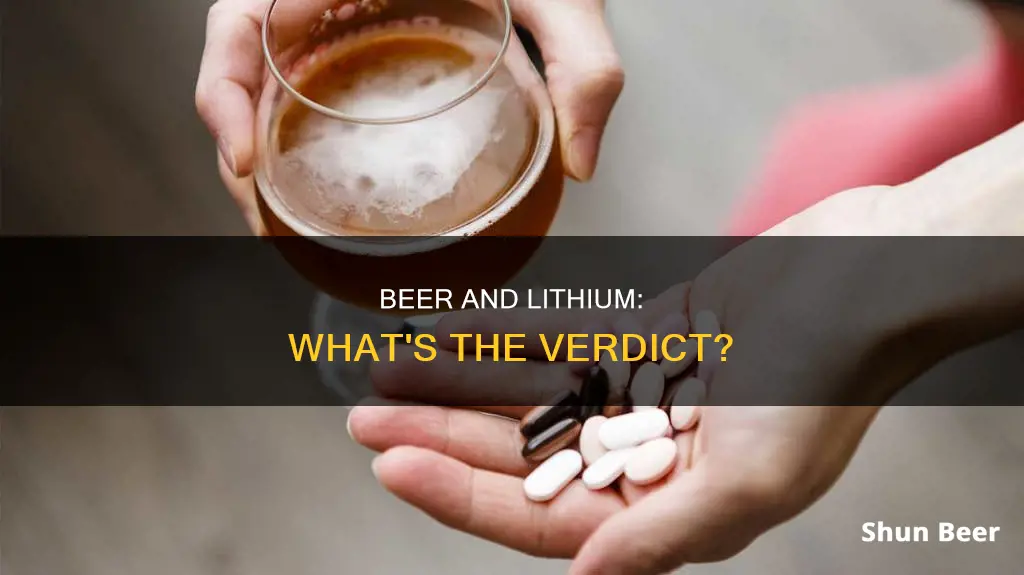
Drinking alcohol while taking lithium can be dangerous. Both substances target the central nervous system, and combining them can lead to increased sedation, dizziness, drowsiness, and impaired thinking and judgment. This can pose a serious risk if you need to drive or operate machinery. In addition, alcohol can interfere with lithium levels, which can negatively affect both your mental and physical health. In severe cases, mixing the two can lead to dehydration and lithium toxicity, which can be life-threatening.
| Characteristics | Values |
|---|---|
| Should you drink beer on lithium? | Doctors advise against consuming alcohol while taking lithium |
| What does lithium treat? | Bipolar disorder, depression, mania, schizophrenia |
| What are the side effects of lithium? | Dizziness, drowsiness, thinning of hair or hair loss, increased thirst and urination, nausea, vomiting, unsteadiness, diabetes insipidus, kidney problems, hypothyroidism |
| What happens when you mix alcohol and lithium? | Intensifies the medication's sedating side effects, may lessen the medication's benefits, may cause dehydration and lithium toxicity |
| Who is at higher risk when combining alcohol and lithium? | People with AUD, people with liver problems, people over 65 years old, people assigned female at birth |
What You'll Learn
- Drinking beer on lithium can lead to dehydration and lithium toxicity
- Combining alcohol and lithium can negatively impact sleep and circadian rhythms
- Both substances have sedative effects, which are intensified when they are mixed
- Alcohol may reduce the benefits of lithium medication
- Drinking on lithium can cause impaired thinking and judgement

Drinking beer on lithium can lead to dehydration and lithium toxicity
Drinking beer, or any other form of alcohol, while on lithium is not recommended by doctors. This is because combining alcohol with lithium can have serious side effects and may reduce the benefits of the medication.
Firstly, both lithium and alcohol have sedative effects on the body. When combined, these effects are intensified, and the medication's benefits may be lessened. This can lead to an increased risk of sedation, drowsiness, dizziness, and impaired thinking and judgment. In turn, this poses a danger to activities that require mental alertness, such as driving or operating machinery.
Secondly, alcohol can interfere with lithium levels in the body, which can have serious implications for both mental and physical health. Alcohol can cause dehydration, which can lead to dangerously high levels of lithium in the blood. This is because lithium is removed from the body by the kidneys, and when dehydrated, the kidneys hold on to lithium for longer than usual. This can result in lithium toxicity, a potentially life-threatening complication.
Therefore, it is crucial for individuals taking lithium to discuss alcohol consumption with their healthcare provider. The risks associated with combining alcohol and lithium may vary depending on age, medical history, and other medications being taken. However, in general, it is advised to avoid consuming alcohol while taking lithium to prevent adverse side effects and health complications.
Insulin and Alcohol: Can You Drink Beer Safely?
You may want to see also

Combining alcohol and lithium can negatively impact sleep and circadian rhythms
Combining alcohol and lithium can have a detrimental impact on sleep and circadian rhythms. Both substances have opposing effects on behavioural circadian rhythms, which are body processes that follow a 24-hour cycle in response to light and dark. Circadian rhythms include sleep, but also other body processes such as body temperature and heart rate.
Alcohol and lithium can negatively impact these processes, which may worsen the symptoms of bipolar disorder. Bipolar disorder is characterised by drastic mood swings, cycling between periods of low moods (depression) and episodes of high moods (mania). The condition is often treated with lithium, which is a first-choice medication for bipolar disorder.
When alcohol is added to the equation, it can increase the nervous system side effects of lithium, such as dizziness, drowsiness, and difficulty concentrating. This can pose a danger when performing activities that require concentration and alertness, such as driving or operating machinery.
Additionally, alcohol can interfere with lithium levels in the body, which can have serious implications for mental and physical health. In severe cases, combining lithium and alcohol can lead to dehydration and lithium toxicity, which can be life-threatening. Therefore, it is generally advised that people taking lithium avoid consuming alcohol.
Drinking Beer in Public: What's Legal in Florida?
You may want to see also

Both substances have sedative effects, which are intensified when they are mixed
Combining alcohol with lithium can have serious consequences. Both substances have sedative effects, which are intensified when they are mixed. This can lead to increased drowsiness, posing a danger to those driving or operating machinery. The combination may also worsen symptoms of bipolar disorder, as both alcohol and lithium affect mood and behavioural circadian rhythms.
The sedative effects of lithium and alcohol can be additive, and in severe cases, this combination can lead to dehydration and lithium toxicity, which can be life-threatening. Alcohol may also reduce the benefits of lithium as a medication for bipolar disorder.
The National Alliance on Mental Illness (NAMI) warns that consuming alcohol while taking lithium can intensify the medication's side effects, including dizziness and drowsiness. People with bipolar disorder are already at an increased risk of alcohol use disorder (AUD), and the combination of AUD and bipolar disorder further elevates the risk of suicide attempts and hospitalisations.
The effects of alcohol and lithium together can be dangerous, and it is generally advised that people taking lithium avoid consuming alcohol. It is important to discuss this interaction with a healthcare provider, as individual risk may vary depending on age, medical history, and other medications.
Drink-In Movies: Beer Allowed?
You may want to see also

Alcohol may reduce the benefits of lithium medication
Lithium is a medication used to treat bipolar disorder, a condition that involves episodes of depression, periods of mania, or both. Bipolar disorder is a mental health condition where people experience drastic mood swings that cycle between periods of low moods (depression) and episodes of high moods (mania). The medication is believed to boost levels of certain chemicals in the brain, such as serotonin.
Alcohol can worsen the symptoms of bipolar disorder, making the condition even more challenging to treat. It can change a person's mood, leading to more mood swings. Research suggests that even drinking small amounts of alcohol can lead to more manic or depressive episodes. Combining alcohol with lithium may also lessen the medication's benefits, making the condition harder to manage.
Additionally, alcohol can increase the nervous system side effects of lithium, such as dizziness, drowsiness, and difficulty concentrating. It can also impair thinking and judgment. The combination of alcohol and lithium can adversely affect sleep and circadian rhythms, which are essential for maintaining stable moods and managing bipolar disorder symptoms.
In conclusion, alcohol may reduce the benefits of lithium medication by interfering with its intended effects and worsening the symptoms of bipolar disorder. It is essential for individuals taking lithium to avoid consuming alcohol and to discuss any concerns with their healthcare provider.
Beer and Prostate Surgery: What You Need to Know
You may want to see also

Drinking on lithium can cause impaired thinking and judgement
Drinking alcohol while taking lithium can have serious consequences. Both substances affect the central nervous system, and combining them can lead to an increase in sedation and other side effects. This can cause impaired thinking and judgement, and pose a danger when performing activities that require mental alertness, such as driving or operating machinery.
The National Alliance on Mental Illness (NAMI) warns that consuming alcohol while taking lithium can reduce the benefits of bipolar disorder medication. Lithium is often prescribed to treat bipolar disorder, a condition that involves episodes of depression, periods of mania, or both. Bipolar disorder is characterised by drastic mood swings, from depressive periods to manic episodes.
Alcohol can worsen the symptoms of bipolar disorder, making the condition even more challenging to treat. It can change a person's mood, leading to more mood swings. Research suggests that even drinking small amounts of alcohol (between 1 and 4 drinks per week) can lead to more manic or depressive episodes. Combining alcohol with lithium may also lessen the medication's benefits and intensify its side effects, such as dizziness and drowsiness.
In severe cases, drinking alcohol while taking lithium can lead to dehydration and lithium toxicity, which can be life-threatening. Lithium toxicity occurs when lithium levels in the body become dangerously high. This can be caused by dehydration, as lithium is removed from the body by the kidneys. When the body is dehydrated, the kidneys hold on to water and lithium for longer, causing lithium levels to become toxic.
Knobel's Beer Rules: What You Need to Know
You may want to see also
Frequently asked questions
Doctors advise people taking lithium to avoid alcohol. Combining alcohol with lithium can increase the medication's sedating side effects, such as drowsiness and dizziness, and may lessen its benefits. In severe cases, it can lead to dehydration and lithium toxicity, which can be life-threatening.
The side effects of drinking alcohol while on lithium can include increased sedation, worsening of bipolar symptoms, and impaired thinking and judgment. It can also negatively affect sleep and circadian rhythms.
Drinking alcohol while taking lithium can be dangerous because both substances target the central nervous system (CNS). This can lead to an increase in sedation and negative effects on one's health.
If you are taking lithium and want to drink alcohol, it is important to first consult your doctor or healthcare provider. They can explain the risks and safest options for you based on your age, medical history, and other medications you may be taking.







